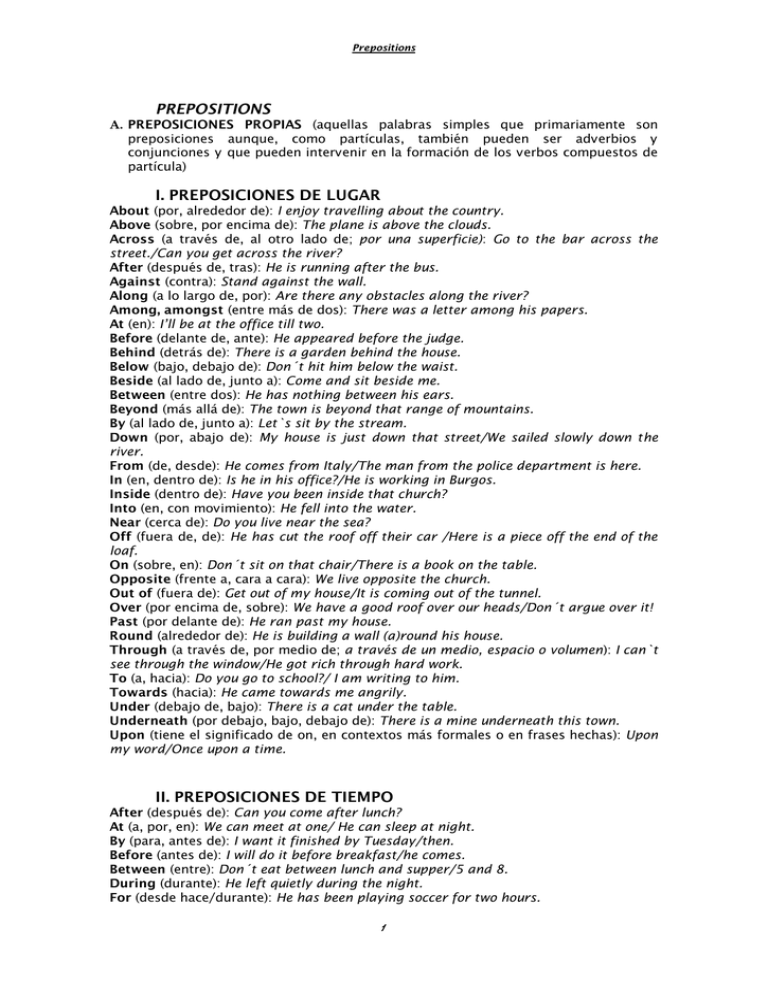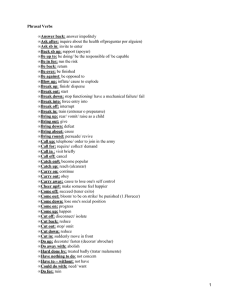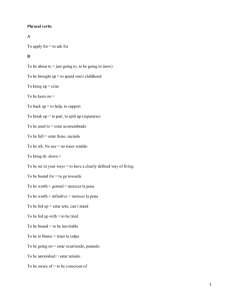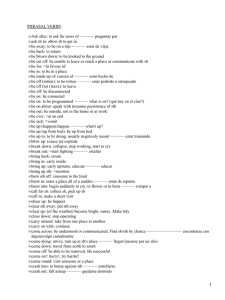PREPOSITIONS I. PREPOSICIONES DE LUGAR II
Anuncio

Prepositions PREPOSITIONS A. PREPOSICIONES PROPIAS (aquellas palabras simples que primariamente son preposiciones aunque, como partículas, también pueden ser adverbios y conjunciones y que pueden intervenir en la formación de los verbos compuestos de partícula) I. PREPOSICIONES DE LUGAR About (por, alrededor de): I enjoy travelling about the country. Above (sobre, por encima de): The plane is above the clouds. Across (a través de, al otro lado de; por una superficie): Go to the bar across the street./Can you get across the river? After (después de, tras): He is running after the bus. Against (contra): Stand against the wall. Along (a lo largo de, por): Are there any obstacles along the river? Among, amongst (entre más de dos): There was a letter among his papers. At (en): I’ll be at the office till two. Before (delante de, ante): He appeared before the judge. Behind (detrás de): There is a garden behind the house. Below (bajo, debajo de): Don´t hit him below the waist. Beside (al lado de, junto a): Come and sit beside me. Between (entre dos): He has nothing between his ears. Beyond (más allá de): The town is beyond that range of mountains. By (al lado de, junto a): Let`s sit by the stream. Down (por, abajo de): My house is just down that street/We sailed slowly down the river. From (de, desde): He comes from Italy/The man from the police department is here. In (en, dentro de): Is he in his office?/He is working in Burgos. Inside (dentro de): Have you been inside that church? Into (en, con movimiento): He fell into the water. Near (cerca de): Do you live near the sea? Off (fuera de, de): He has cut the roof off their car /Here is a piece off the end of the loaf. On (sobre, en): Don´t sit on that chair/There is a book on the table. Opposite (frente a, cara a cara): We live opposite the church. Out of (fuera de): Get out of my house/It is coming out of the tunnel. Over (por encima de, sobre): We have a good roof over our heads/Don´t argue over it! Past (por delante de): He ran past my house. Round (alrededor de): He is building a wall (a)round his house. Through (a través de, por medio de; a través de un medio, espacio o volumen): I can`t see through the window/He got rich through hard work. To (a, hacia): Do you go to school?/ I am writing to him. Towards (hacia): He came towards me angrily. Under (debajo de, bajo): There is a cat under the table. Underneath (por debajo, bajo, debajo de): There is a mine underneath this town. Upon (tiene el significado de on, en contextos más formales o en frases hechas): Upon my word/Once upon a time. II. PREPOSICIONES DE TIEMPO After (después de): Can you come after lunch? At (a, por, en): We can meet at one/ He can sleep at night. By (para, antes de): I want it finished by Tuesday/then. Before (antes de): I will do it before breakfast/he comes. Between (entre): Don´t eat between lunch and supper/5 and 8. During (durante): He left quietly during the night. For (desde hace/durante): He has been playing soccer for two hours. 1 Prepositions They will be here for a month. From… to/till/until (desde, de…hasta): I worked here from1990 to 1996. In (en): I do not like the cold in winter/Were you here in March? On (en, fechas fijas): I´m going on Monday. Since (desde): I’ve played tennis since 1995. Till, until (hasta; tiempo): Stay here till he comes back. Through (por): They drove on through the morning. Up to (hasta ; lugares y tiempo): These are the results up to last week. III. PREPOSICIONES QUE MUESTRAN OTRAS CIRCUNSTANCIAS. About (acerca de): This movie is about birds. As (como, de, en función de): He works as a policeman. Like (como, parecido a): He works like a slave. By (por medio de, cerca de, por, etc.): He made a lot of money by robbing people. It was built by John. By your interest, you can borrow it. For (para, por): Is this for cleaning?/ He was punished for being so rude. On (sobre, al): Have you read the article on New York?/On arriving, call me up. Out of (de entre): Eight out of ten people…. B. PREPOSICIONES IMPROPIAS I. PREPOSICIONES DERIVADAS DE PARTICIPIOS DE PRESENTE. According to (según): According to him,…… Regarding to (con relación a): Regarding to the third problem, it is better to ask for help. Concerning (referente a): I received a letter concerning their plans. Belonging to (perteneciente a): He did not receive things belonging to him. II. PREPOSICIONES COMPUESTAS. Along with (junto a/con): John, along with his family, thinks that… As far as (hasta; lugar): Walk as far as the bank… Apart from (lejos de): Don´t run away from me! Because of (a causa de): We stayed at home because of the rain. By dint of (a fuerza de): By dint of hard work,…. Close to (cerca de): Don´t light a fire close to the baby. Due to (debido a): Due to his generosity…. Except for (excepto) Everything was destroyed, except for the garden. Far from (lejos de): Far from needing help, he was doing it very well. For the sake of (por consideración a): They decided to stay at home for the sake of their parents. For want of (por falta de): For want of something. In addition to (además de): In addition to his job, he also sells cars. In case of (en caso de): In case of danger,… In comparison with (en comparación con): In comparison with my car, his…. In compliance with (de acuerdo con): We did it in compliance with the instructions. In favour of (a favor de): If you are in favour of it… In front of (delante de): I parked my car in front of the bar. In order to (para, con el fin de que): I stopped in order to… In the middle of (en medio de): He lost it in the middle of the party. In spite of (a pesar de): I escaped in spite of the police dogs. Instead of (en vez de): I drink water instead of coke. On account of (debido a, a causa de): It crashed on account of a faulty engine. On behalf of (por medio de, en representación de): I want to say something on behalf of my friends. On top of (encima de): It could land on top of that building. 2 Prepositions a) Prepositions of time Las preposiciones son palabras como by, for, into, at, with, from… Suelen llevar como objeto nombres (pronombre personal objeto…) o expresiones sustantivas. Cuando se usa un verbo después de una preposición, el verbo va normalmente con la forma ing.: Before leaving your room… Las preposiciones suelen ir colocadas delante de nombres y pronombres pero pueden ir detrás de verbos, nombres y adjetivos. Hay preposiciones que se suelen usar en expresiones de tiempo y espacio. Algunas de las más comunes de tiempo son: after, at, before, by, during, for, from, in, on, since, to, until AT Se usa para las horas night. Expresiones: at night at noon at midnight at dinner time del día, festividades, fines de semana y con el sustantivo at at at at sunrise sunset this moment Christmas, Easter, New Year at at at at the weekend first last weekends IN Se usa para periodos más largos de tiempo (semanas, meses, años, estaciones y para partes del día excepto night y noon). Expresiones: in the morning in those days in a minute in the afternoon in the meantime in three hours in the evening in a second in six weeks in spring in the Middle Ages in a week’s time ON Se usa con días de la semana, fechas y partes del día de la semana: on June 10th, on Christmas Day, on a summer evening, on a Sunday morning Una expresión importante es on time (“a tiempo”) que no se debe confundir con in time (“con un poco de antelación; antes de la hora”) FOR y SINCE Se emplean para señalar cuánto tiempo ha durado algo desde el pasado hasta el momento actual: FOR (se refiere a la duración del periodo) y SINCE (señala el tiempo en que el periodo empezó y desde entonces la acción continúa hasta el momento presente): I have lived in Villasana for five years/ She has not called me up since last September. FROM Suele ir frecuentemente con till/until/to para señalar el principio y el final de un periodo de tiempo: We go to school from September to/till/until June. DURING Va seguida de un nombre y se refiere a un periodo de tiempo en el que una acción tuvo lugar o continuó: During the summer, many people go to summer schools in the United States. *La diferencia entre for y during es que for indica cuánto tiempo y during cuándo ocurrió algo: I was in France for three months during the year. BY Significa “no más tarde de”: I have to finish the project by next Monday/the end of the week… *By day(=durante el día) y by night(=durante la noche) Time expressions: 3 Prepositions At first, in the beginning (no se usan para hacer una lista de puntos en una argumentación, sino: first, in the first place, to begin with. In the end (no para argumentar), finally. Para lugares, at the end. eventually = after a long period of time. at last comes at the end of a series of events. for the time being = until things change in the meantime = meanwhile in due course = in the future, at the proper time. now and then = from time to time, at irregular intervals. these days = at the present time in those days refers to the past nowadays refers to the present in contrast to the past. at present/at the present time = now presently = soon (British E.); now (American E.) at the moment = now; at this moment puede significar “ahora” (en una historia…) b) Prepositions of place Se usan para indicar un lugar. Algunas de las más comunes: above, at, behind, below, beside, between, in, in front of, near, next to, on, opposite, over, under. AT at 15 Panaderos Street at a party at the door at home at a meeting at the bus-stop at school at the office at the top at work at the station at the bottom IN Suele ir con países, ciudades, calles, edificios, ríos y mares. in a country in a room in the Atlantic in a town/city in a building in Panaderos Street *AT se considera el lugar como un punto (I will wait for you at the office) e IN se considera el lugar como un espacio (I will be working in the office) ON En ocasiones tendría una cierta idea de superficie. On the floor on a page on the left on the wall on the right on the second floor At, in: Confussion is only possible when the point of view of the speaker is different. Someone who lives in a city may say: My friend, Mary, lives at Vallejo (small town). A farmer living in a village outside the town may say: Mary lives in Vallejo. A housewife answering the phone may say: My husband is at his office. (at his place of work). His secretary, sitting outside the office may say: Mr Jones is in his office. (inside it). In, out, on, off, onto, out of, on to: There’s a boat on the lake (floating on the surface) He is in the water (suwimming) He took his hat off (It was on his head) The dentist took my tooth out (It was in =inside my head) He got into his car. He got on to his bicycle. He fell out of his pram. He fell off the roof. In casi siempre sugiere “inside en inglés; on significa “en la superficie de”. Out es el opuesto de in, y off el opuesto de on. 4 Prepositions c) Prepositions of direction Principalmente con verbos de movimiento. Algunas de las más comunes son: Across Along Down From into on the way on to out of past through to toward(s) up Con verbos de movimiento usamos into y out of, on to y off. Decimos get on (to) y get off para autobus, tren, avión o barco y get in(to) y get out of para coches, taxis y barcos pequeños. d) Other useful prepositions OF Se utiliza para expresar la posesión, el valor, las cantidades o medidas: A friend of mine/Hundreds of pounds… FOR Además de indicar periodos de tiempo también puede indicar propósito o distancia: He went back to his home town for the summer/He drove for several miles… FROM Se emplea para señalar el origen de una persona o cosa o de qué está hecho algo: He comes from Germany/It is made from fresh fruit. MADE OF (vemos el producto con el que está hecho algo: A chair is made of wood) y MADE FROM no podemos ver el producto porque ha sido transformado:This juice is made from fresh fruit). ABOUT Se emplea para expresar el tema, la idea sobre aquello que versa la conversación, un libro…:He was talking about his new play WITH Suele significar “en compañía de alguien” y también indica qué es lo que se emplea para hacer algo: He came with Anne/I wrote all the letters with the same ballpen. Hay casos en que las preposiciones no van delante sino detrás, principalmente en inglés coloquial: a) En preguntas que empiezan por una preposición + whom/whose/what/where/which: For whom are the bells tolling? (formal)/Who are the bells tolling for? (coloquial) b) En las oraciones de relativo al omitirse el pronombre relativo:The boy with whom I am going out (formal)/The boy I am going out with (coloquial) e) Expressions with prepositions Ability at (clever at, good at, bad at, etc) Afraid of (frightened of/by, terrified of/by, nervous of, scared of, etc) Agree with a person Agree about a subject of discussion Agree on a matter for decision Agree to a suggestion or proposal All (of) 5 Prepositions Angry with /at a person for doing something Angry about/at something Anger,cross,furious,upset, annoyed, disappointed, pleased, impressed + with /about Anxious about (=worried about) Anxious for + noun (=eager for, wanting) Anxious + infinitive (=eager, wanting) Any (of), each, either…+ of Apologize for (sorry, forgive + for) Arrive at/in Ask for money, objects, info., etc Ask questions, the way, the time, favours. Astonished at/by Bad at activities (ability at, clever at, good at, skill at, skilful at, terrible at, etc.) Because (of) Believe in God, Father Christmas, etc (= have faith in) Believe a person or a statement (= accept as truthful) Blue with cold (red with anger/embarrasment, green with envy, white with rage, etc.) Borrow + object + from Both (of) Bump into (crash,drive, run + into) Call after (name after) Care about (= consider important) Care for (=(1) like,love.(2) look after) Take care of (= look after) Clever at an activity Congratulate + object + on ; congratulations on Crash into Depend on; dependent on; dependence on Die of Different from (sometimes to, American from or than) Difficulty with something, (in) doing something Disappointed with somebody; with (at/about) something (also disgusted, pleased) Discussion about (on/of) sth. To discuss sth. Disgusted with sb.; with/at sth. Divide + object + into Dozen(s) (of) Dream of (= think of, imagine) Dream about (while asleep) Dress (+object+) in Drive into Each (of) Effect on (influence on) Either (orf) Enough (of) Every (one of) Example of Explain sth. to sb. (not Explain sb sth) Explanation of/for sth (A) few (of) Get in(to) and out of a car, taxi or small boat Get on(to) and off a bus,train, plane or ship Good at Half (of) Hundred(s) (of) The idea of …-ing Ill with 6 Prepositions Impressed with (by) (pleased, disappointed, disguste + with) Independent of; independence of (from) (depend on, dependent on, dependence on) Influence on (effect on) Insist on …-ing Interest in; interested in Kind to (A) lack of To lack (no prep.) To be lacking in Laugh at Less (of) Listen to (A) little (of) Look at (= point one‟s eyes at) Look after (= take care of) Look for (= try to find) Many (of) Marriage to; (get) married to To marry sb. (no prep.) The matter with (wrong with) More (of) Most (of) Much (of) Name + obj. + after (American name…for) Near (to) Neither (of) Nice to (kind,polite, rude/ to) None (of) Participate in (take part in) Pay for a drink etc. Pleased with sb.; pleased with (about/at) sth. Polite to Prevent + obj. from …-ing Proof of Reason for Remind + obj. + of Responsible for; responsibility for Rude to Run into Search for (= look for) Search (w/o prep.) (= look through, look everywhere in/on) Several (of) Shivering with cold (trembling with fear, rage; shaking with anger) Shocked at Shoot at (throw at) Shout at (aggressive) Shout to (to communicate = call to) Skill at; skilled at; skilful at Smile at (laugh at) Some (of) Speak to/with (with Am. English) (talk to/with; have a chat with) Succed in/at; success in/at; successful in/at (unsuccesful in /at) Suffer from Superlatives + in (referring to place) Surprised at/by (astonished at/by; shocked at/by) Take part in (participate in) Talk to (with) (with Am. English) 7 Prepositions Think of/about (not usually think + infinitive) The thought of …-ing Thousands (of) Throw + object + at (aggressive) Throw + object + to (in a game, etc) (shout at/to) Trembling with rage or fear Typical of Which (of) Write (to) Wrong with PREPOSITIONS BEFORE PARTICULAR WORDS AND EXPRESSIONS At the cinema, at the theatre At a party At university, at Oxford (university), etc. A book by Graham Greene, a concerto by Bartok; a film by Fassbinder, etc. From … point of view For … reason To come/go for a walk; for a run; for a drive; for a swim, etc. In pen, pencil, ink, etc In the rain, snow, etc. In loud/quiet/high/low, etc. voice In a suit, raincoat,skirt, shirt, hat, etc. In the end (= finally, after a long time, after a lot of complications) At the end (= at the point where sth stops) In time (=with enough time to spare; not late) On time (= at exactly the right time) In my opinion On the radio; on TV; on the phone EXPRESSIONS WITHOUT PREPOSITIONS To discuss (a discussion about) to marry (to get married to) To lack (a lack of; to be lacking in) NOUNS + PREPOSITIONS a cheque FOR (a sum of money) a demand/ a need FOR sth a reason FOR sth a rise/an increase/ a fall/ a decrease IN sth an advantage/ a disadvantage OF sth ( but there is an advantage IN doing sth) a cause OF sth a photograph/ a picture OF sb/sth damage TO sth an invitation TO a party/ a wedding etc. a reaction TO sth a solution TO a problem/ an answer TO a question/ a reply to a letter/ a key TO a door an attitude TO/TOWARDS sb/sth (but a relationship/ a connection/ contact/ a difference BETWEEN two things 8 Prepositions PREPOSITION + NOUN to pay BY cheque (but „to pay IN cash‟ or „to pay cash‟) (to do sth) BY accident/mistake/chance a play BY Shakespeare/ a painting BY Rembrandt/ a novel BY Tolstoy etc. (to be/to fall) IN love WITH sb IN (my) opinion (to be) ON fire (to be) ON the telephone/phone ON television/ON the radio (to be/to go) ON a diet (to be/to go) ON strike (tobe/ to go) ON holiday/ ON business/ ON a trip/ ON a tour/ ON an excursion/ ON a cruise/ ON an expedition etc. (also „go to a place FOR a holiday‟, „ For my holiday(s)‟) (to go/to come) FOR a walk/ FOR a swim/ FOR a drink etc. (to have sth) FOR breakfast/lunch/dinner ADJECTIVE + PREPOSITION nice/ kind/ good/ generous/ mean/ stupid/ silly/ intelligent/ clever/ sensible/ (im)polite/ rude/ unreasonable OF sb (to do sth) (but: (to be) nice / kind / good / generous / mean / (im)polite / rude / (um)pleasant / (un)friendly / cruel TO sb) angry/annoyed/furious ABOUT sth/WITH sb FOR doing sth delighted/pleased/satisfied/disappointed WITH sth bored/fed up WITH sth surprised/shocked/amazed/astonished AT/BY sth excited/worried/upset ABOUT sth afraid/frightened/terrified/scared OF s‟one/sth proud/ashamed OF s‟one/sth jealous/envious/suspicious OF s‟one/sth aware/conscious OF sth good/bad/excellent/brilliant/hopeless AT (doing) sth married/engaged TO s‟one sorry ABOUT sth (but: „sorry FOR doing sth‟) (+ usual: „I`m sorry I …‟) (to feel/to be) sorry FOR s‟one impressed BY/WITH s‟one/sth famous FOR sth responsible FOR sth different FROM/TO s‟one/sth interested IN sth capable/incapable OF sth fond OF s‟one/sth full OF sth short OF sth tired OF sth Keen ON sth similar TO sth crowded WITH (people etc.) VERB + PREPOSITION apologise (TO s‟one) FOR sth apply FOR a job/ aplace at university, etc. believe IN sth belong TO s‟one 9 Prepositions care ABOUT s‟one/sth care FOR s‟one/sth (a. like sth (usually ? and - sentences).b. look after s‟one) take care OF s‟one/sth (= look after) collide WITH s‟one/sth complain (TO s‟one) ABOUT s‟one/sth concentrate ON sth consist OF sth crash/drive/bump/run INTO s‟one/sth depend ON s‟one/sth die OF an illness dream ABOUT s‟one/sth dream OF being sth/doing sth (= imagine) (also: dream OF doing sth) happen TO s‟one/sth hear ABOUT sth (= be told about sth) hear OF s‟one/sth (= know that s‟one/sth exists) hear FROM s‟one (= receive a letter/ a telephone call from s‟one) laugh/smile AT s‟one/sth listen TO s‟one/sth live ON money/food look AT s‟one/sth (have a look AT, stare AT, glance AT) look FOR s‟one/sth (= try to find) look AFTER s‟one/sth (= take care of) pay (s‟one) FOR sth rely ON s‟one/sth search (a person/ a place/ a bag etc.) FOR s‟one/sth shout AT s‟one (when you are angry) speak/ talk TO s‟one („with‟ is also possible but less usual) suffer FROM an illness think ABOUT s‟one/sth (= consider, concentrate the mind on) think OF s‟one/sth (= remember, bring to mind, have an idea).Also when we ask for or give an opinion. The difference between think Of and think ABOUT is sometimes very small. Often you can use OF or ABOUT (e.g. My sister is thinking of/about going to Canada) wait FOR s‟one/sth write TO s‟one We do not use a preposition with these verbs: phone s‟one discuss sth enter (= go into a place) VERB + OBJECT + PREPOSITION accuse s‟one OF (doing) sth ask (s‟one) FOR sth (but: ‟ask (s‟one) a question‟) blame s‟one/sth FOR sth or blame sth ON s‟one/sth. Also: „(s‟one is) to blame FOR sth borrow sth FROM s‟one charge s‟one WITH (an offence/ a crime) congratulate s‟one ON (doing) sth divide/ cut/ split sth INTO (two or more parts) do sth ABOUT sth (= do sth to improve a bad situation) 10 Prepositions explain ( a problem/ a situation/ a word etc.) TO s‟one. Also: „explain (TO s‟one) that/ what/ how/ why …‟ (note the word order) invite s‟one TO (a party/ awedding etc.) leave (a place) FOR (another place) point/aim sth AT s‟one/sth prefer s‟one/sth TO s‟one/sth protect s‟one/sth FROM/AGAINST s‟one/sth provide s‟one WITH sth regard s‟one/sth AS sth remind s‟one n s‟one/sth (= cause s‟one to remember) .But: „remind s‟one ABOUT sth (= tell s‟one not to forget) sentence s‟one TO (a period of imprisonment) spend (money) ON sth throw sth AT s‟one/sth (in order to hit them) but throw sth TO s‟one (for s‟one to catch) translate (a book etc.) FROM one language INTO another language warn s‟one ABOUT s‟one/sth (OF is also possible sometimes) 11


